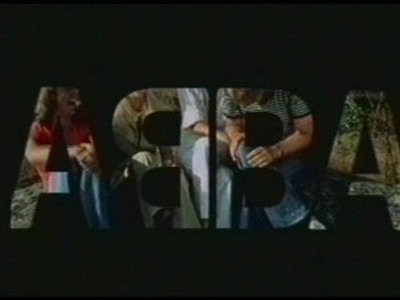
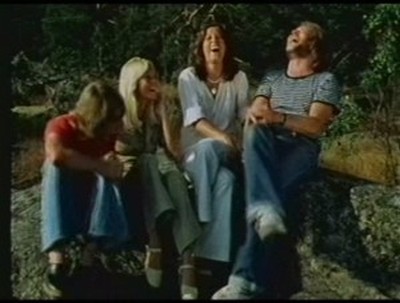
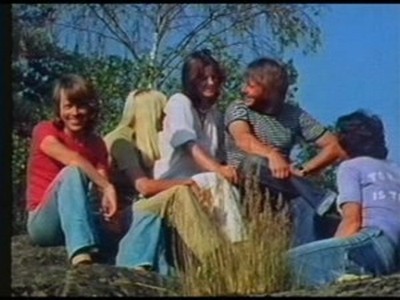
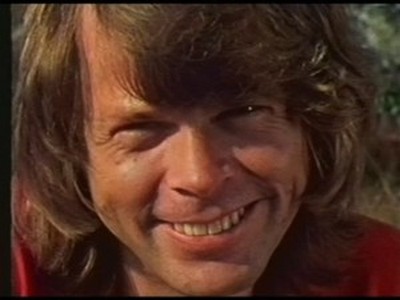

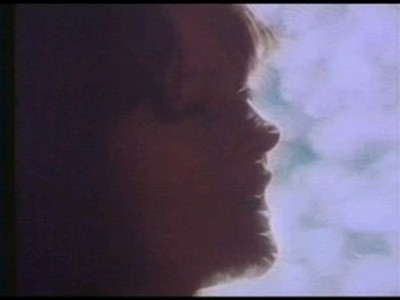
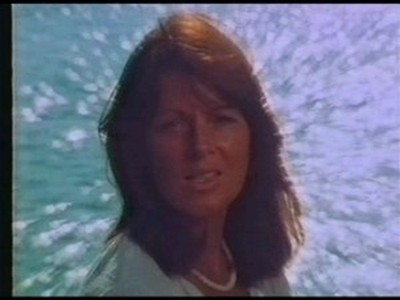
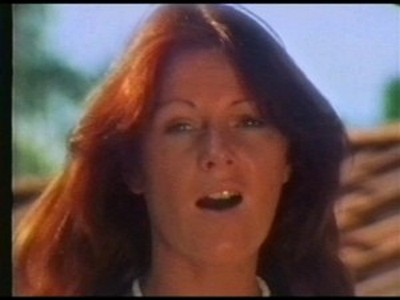
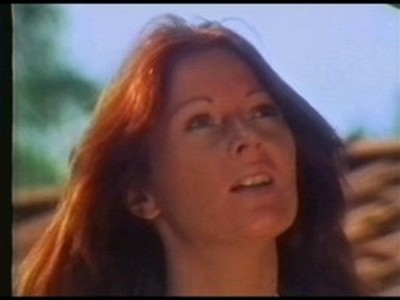
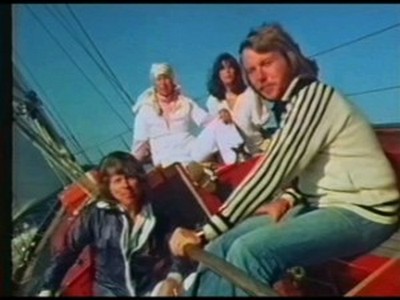
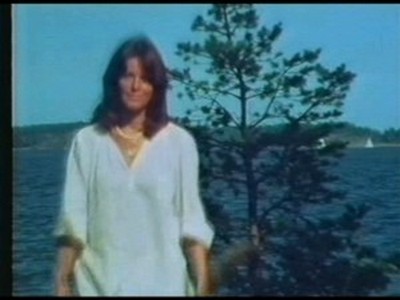
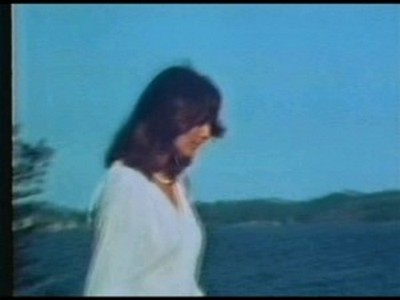
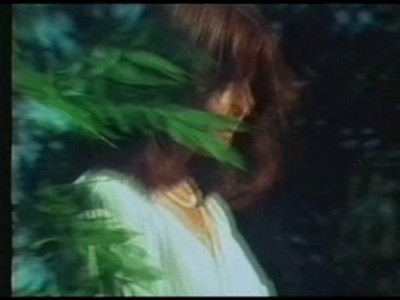
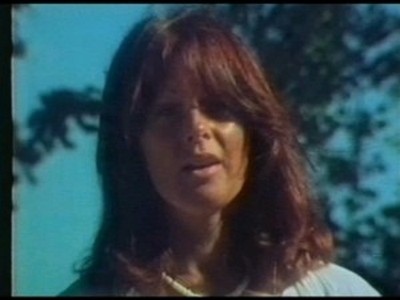
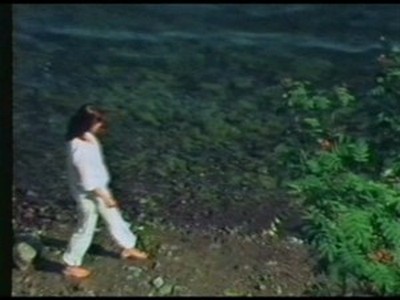
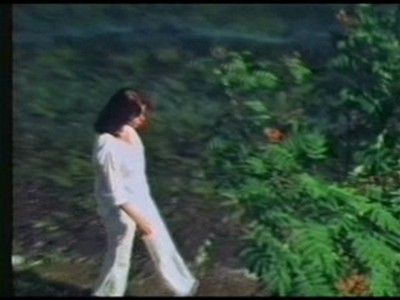
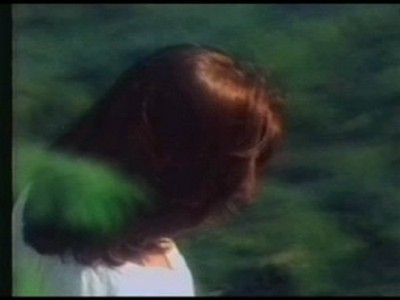
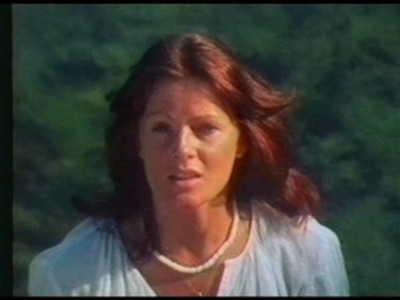
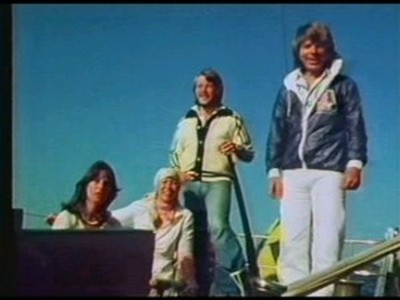
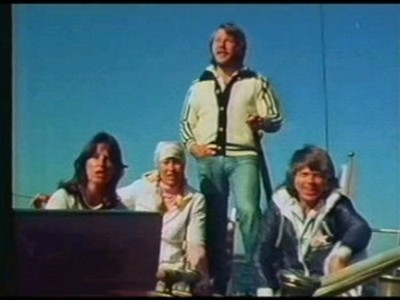
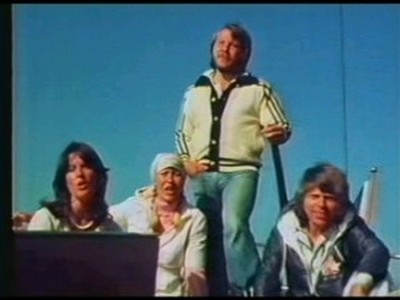
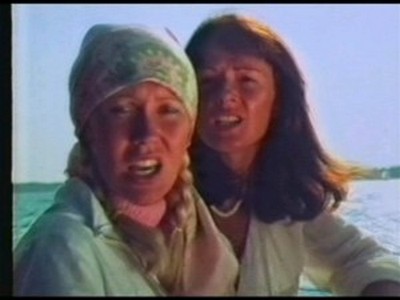
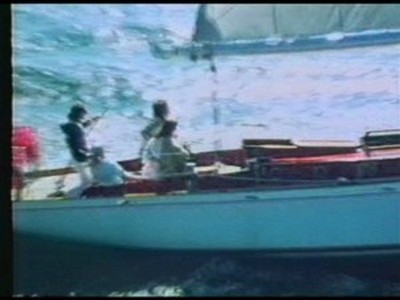
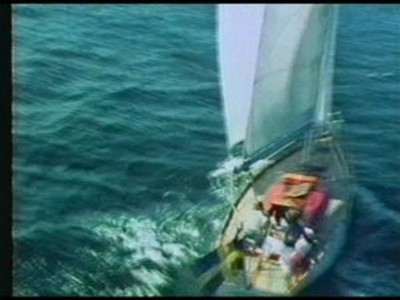

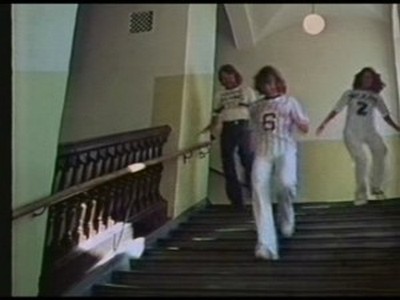
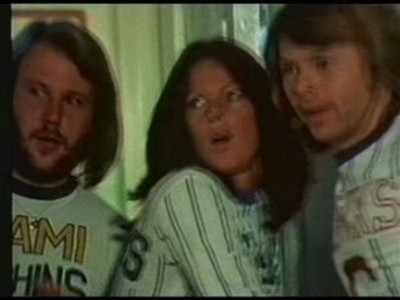
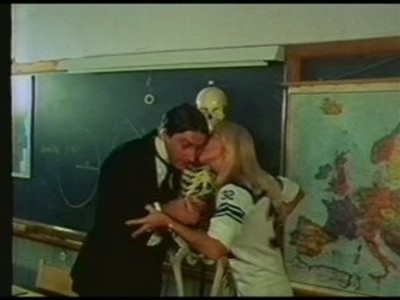
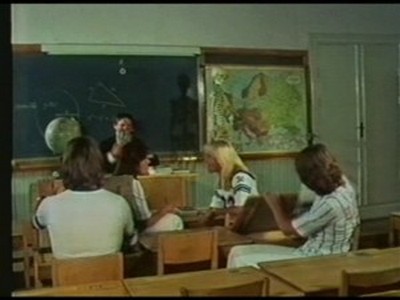
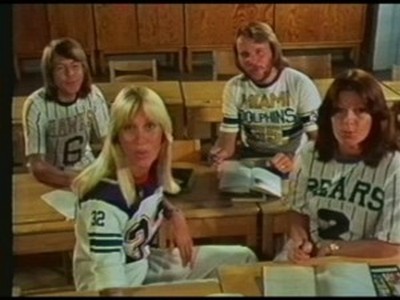
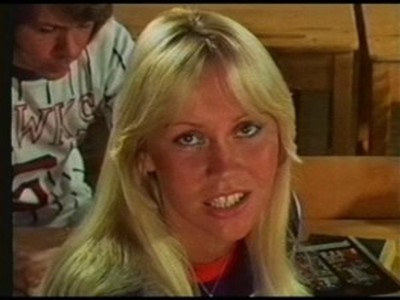
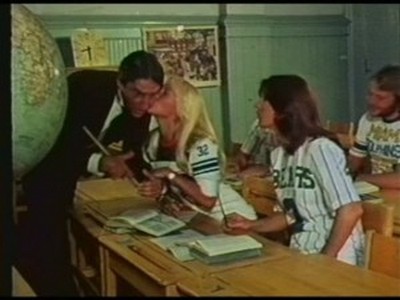
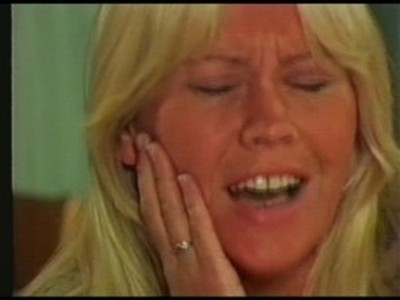
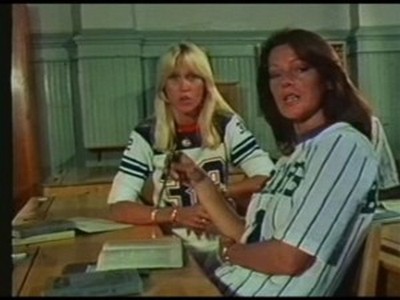
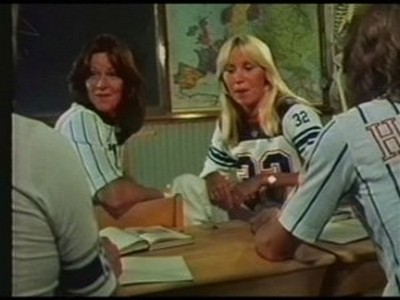
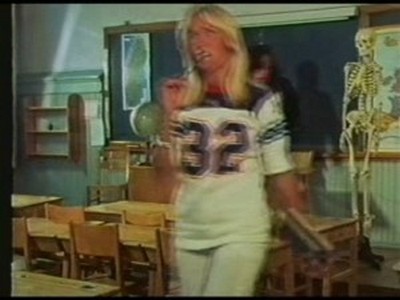
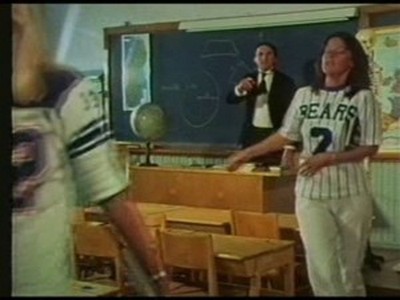
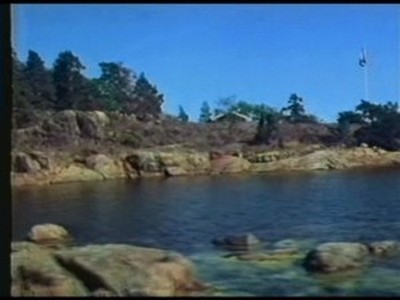
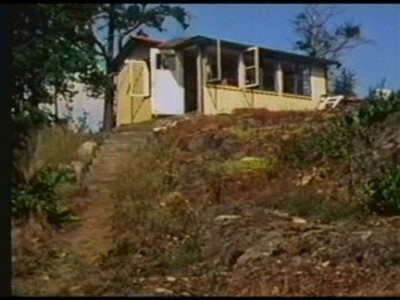
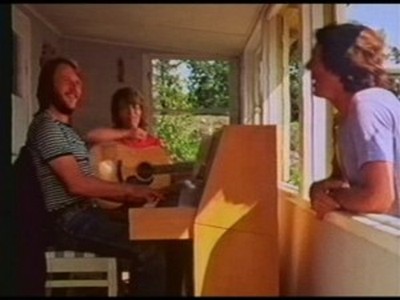
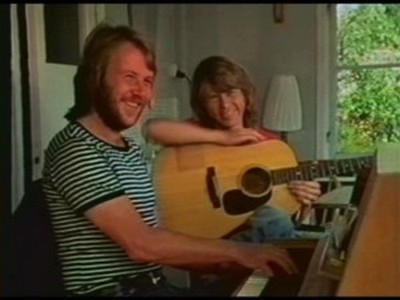
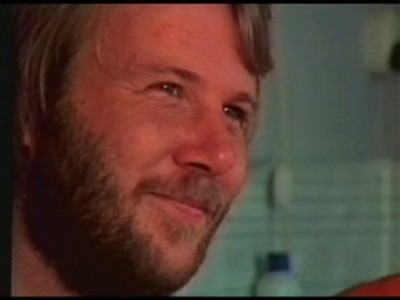
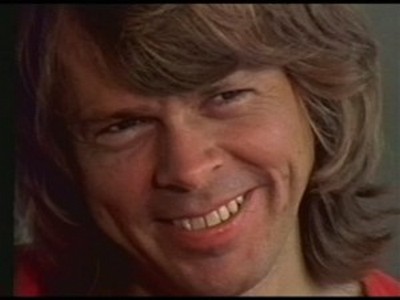
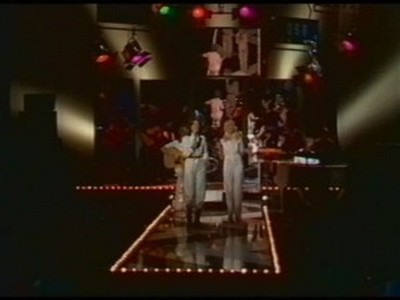
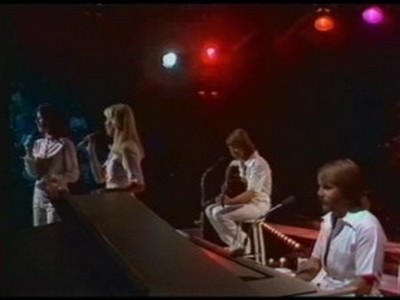
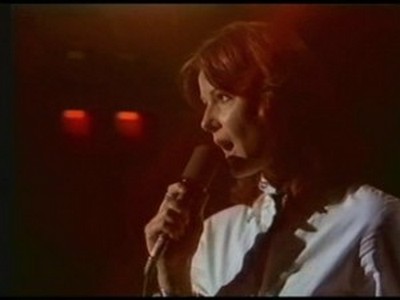
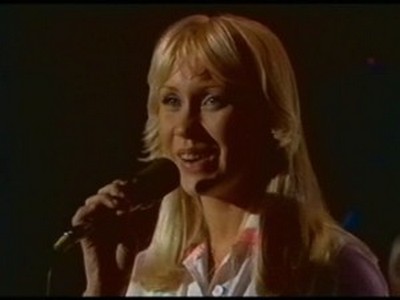
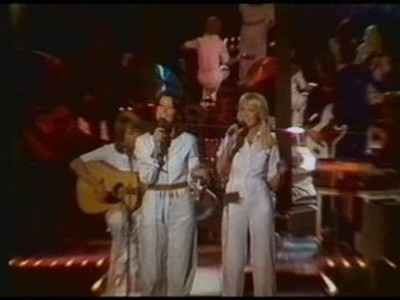
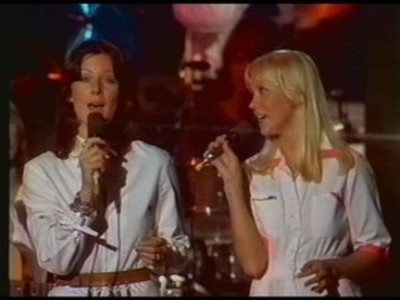
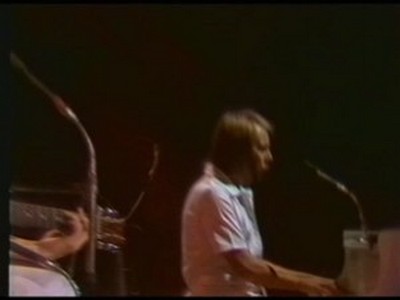
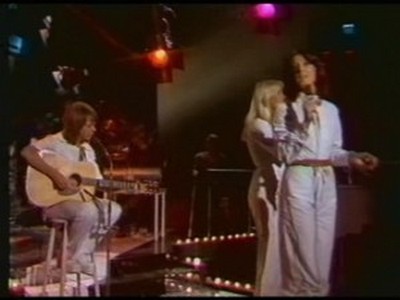

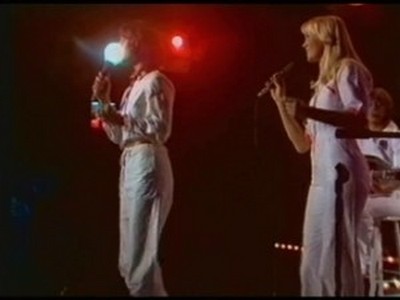
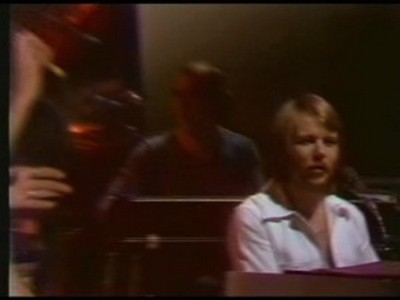
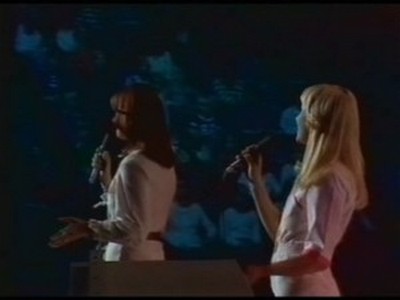
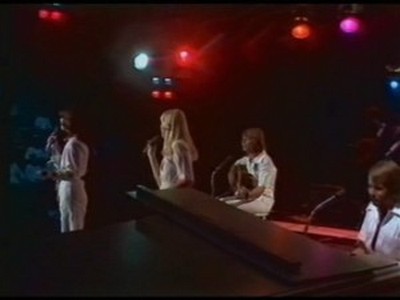
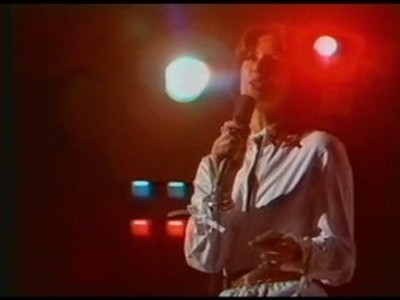
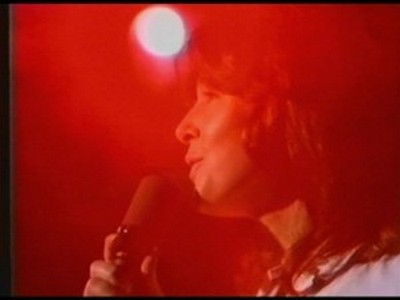
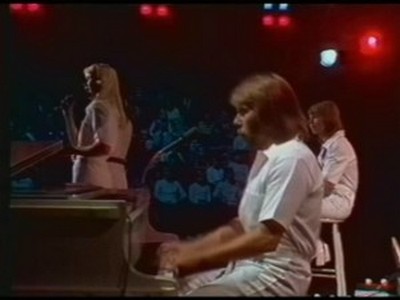
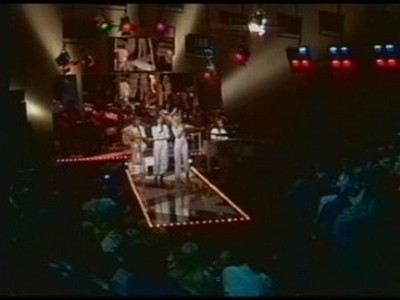
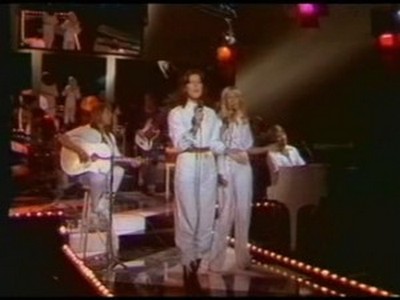
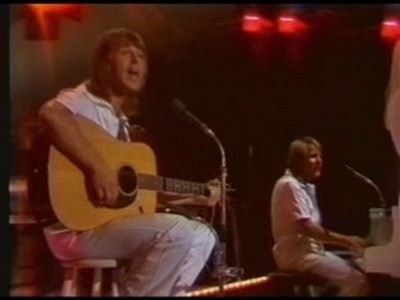
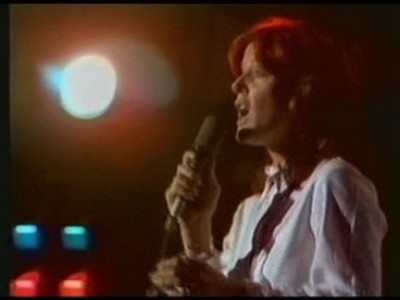
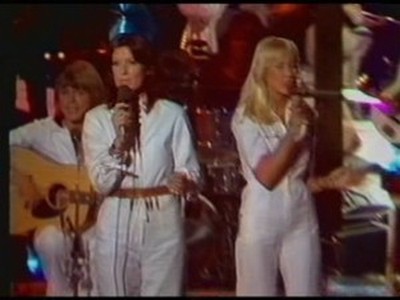
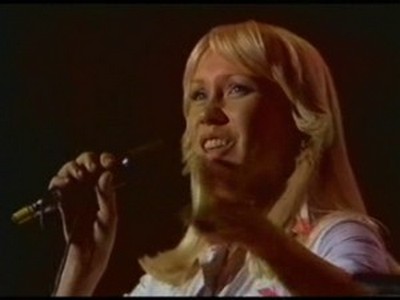
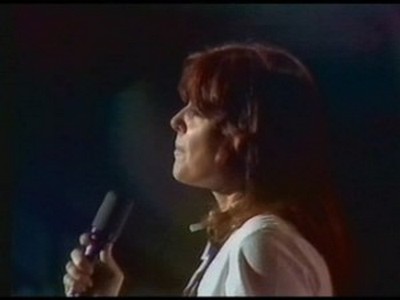
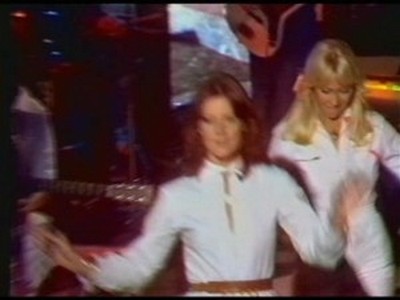
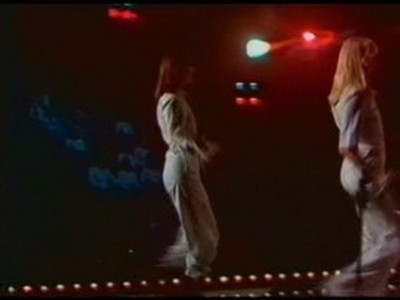
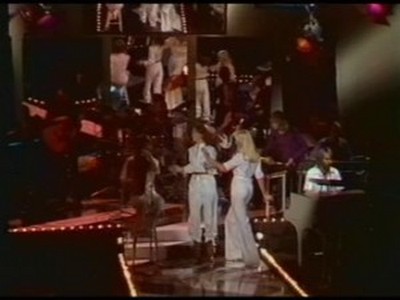
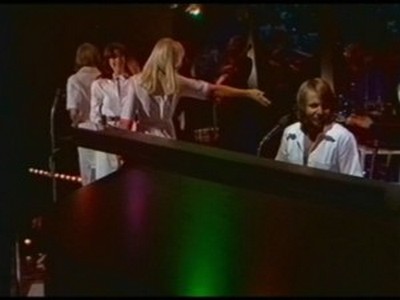
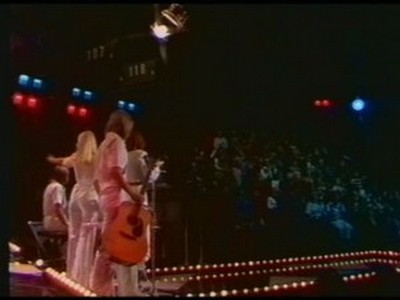
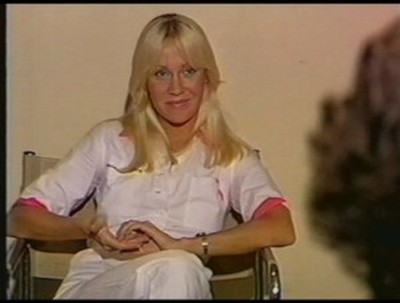
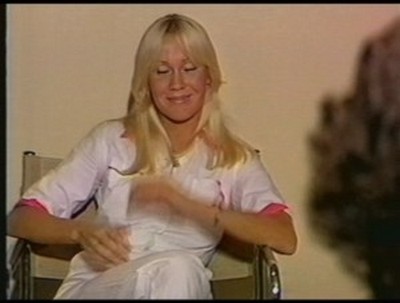
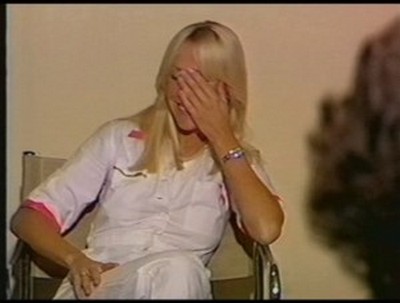
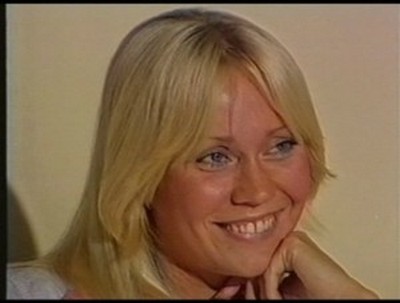
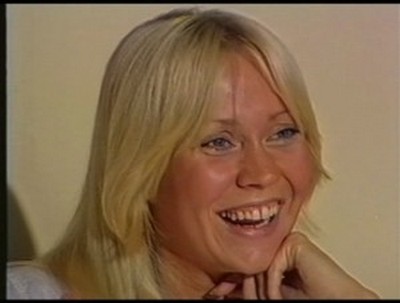
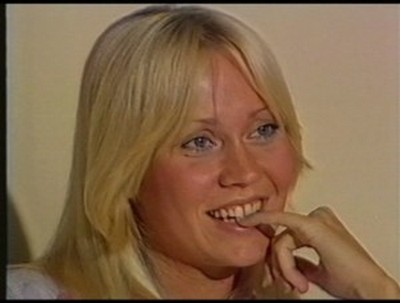
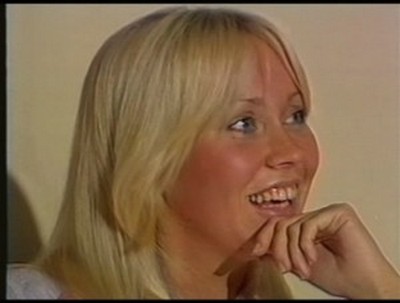
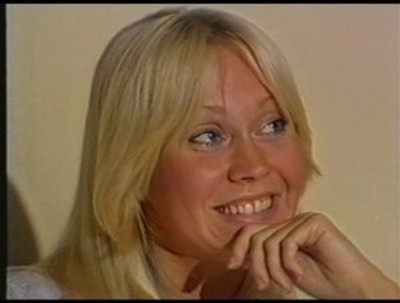
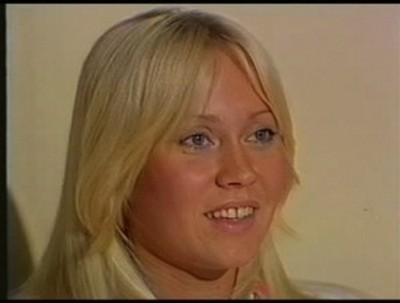
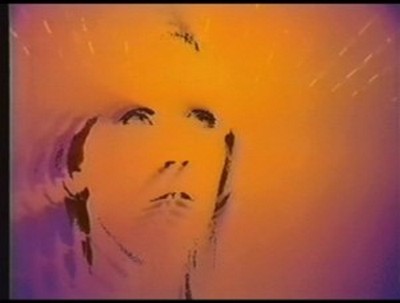
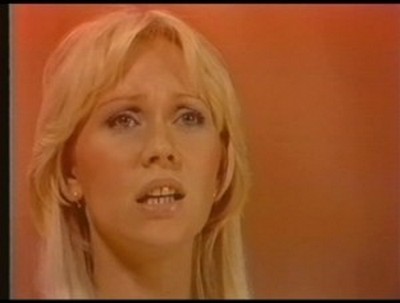
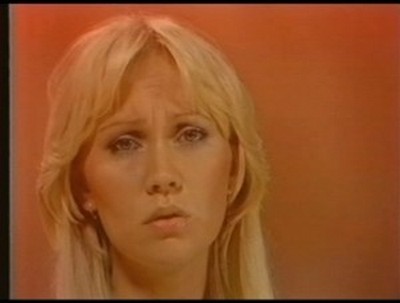
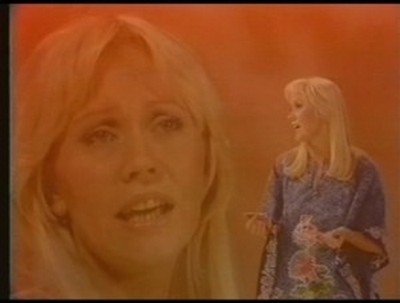
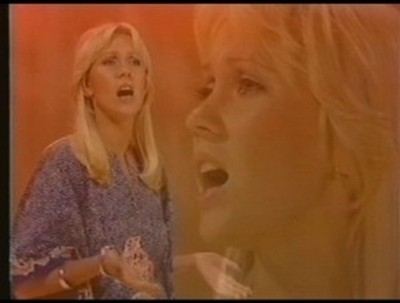
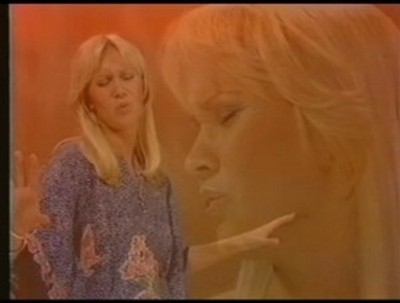
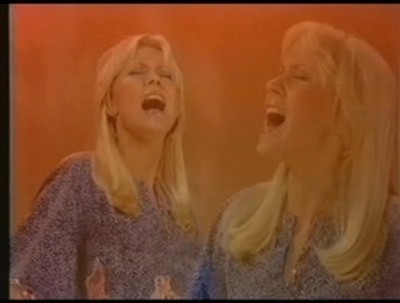
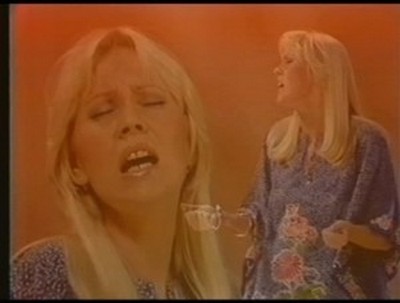
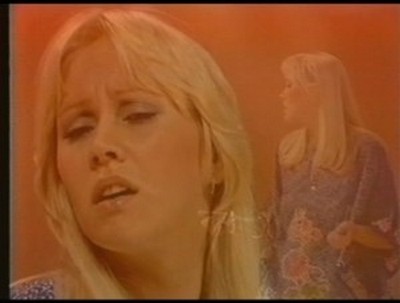
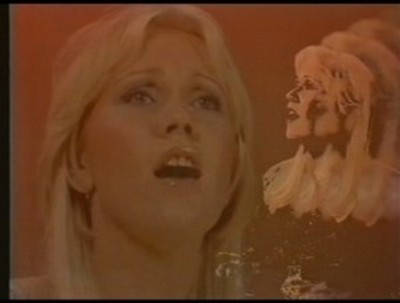
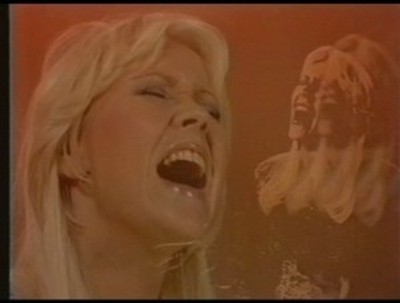
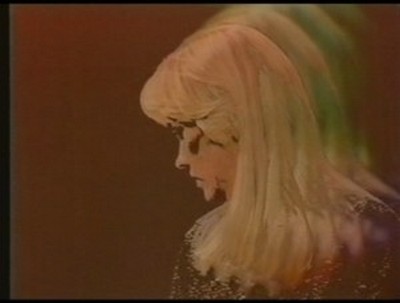
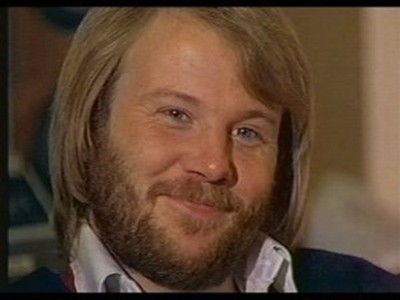
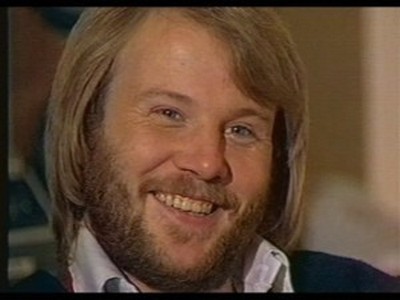
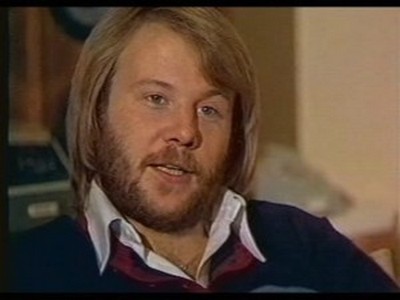
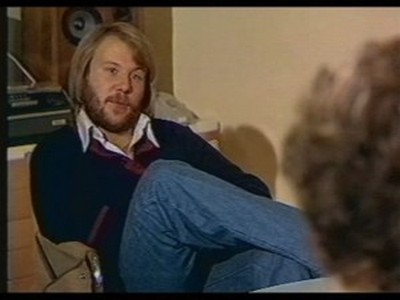
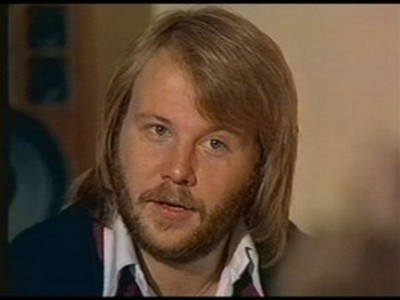
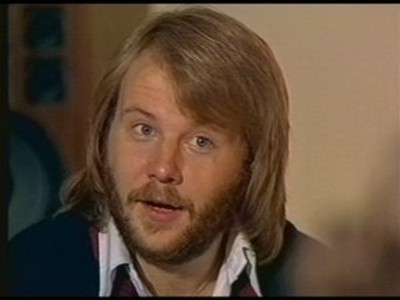
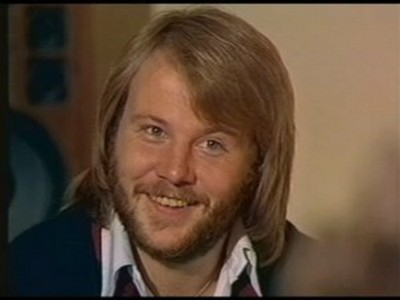
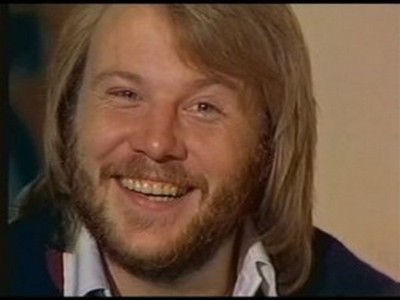
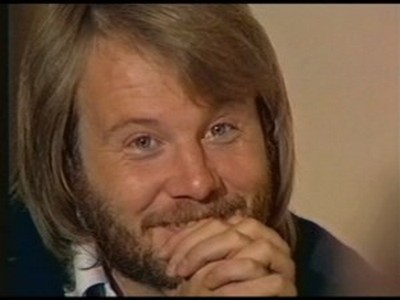
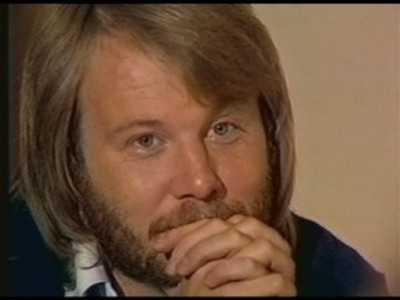
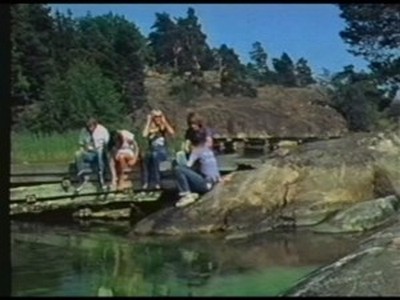
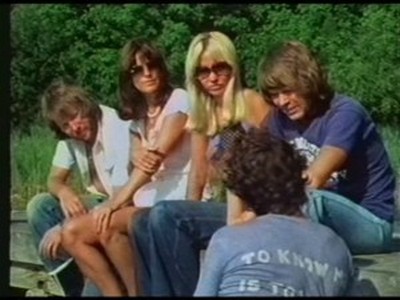
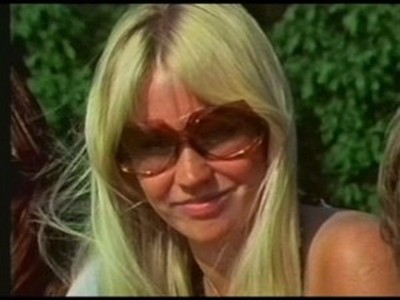
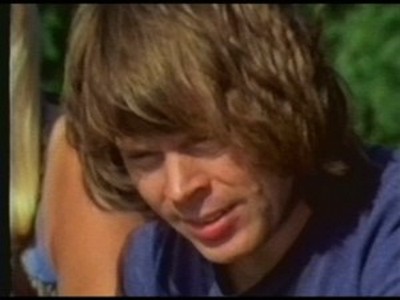
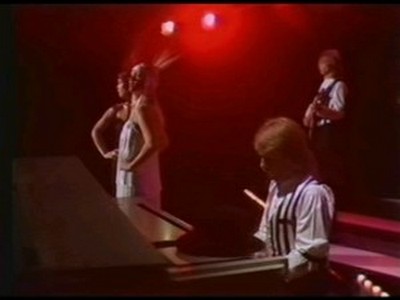

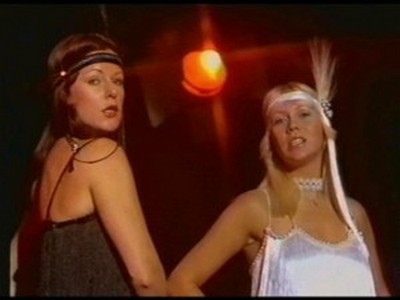
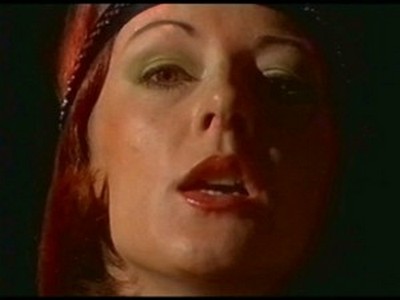
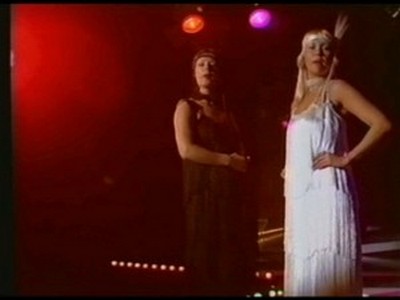
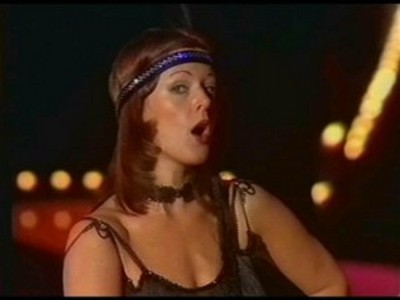
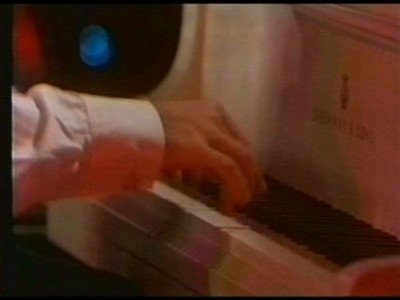

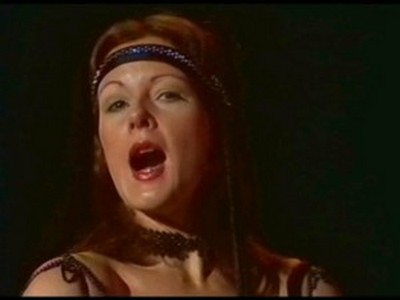

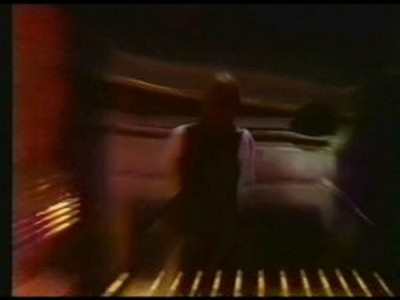
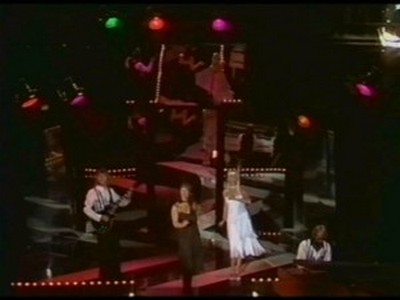
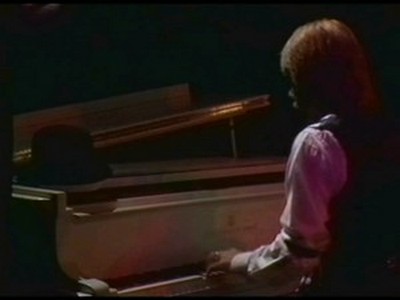
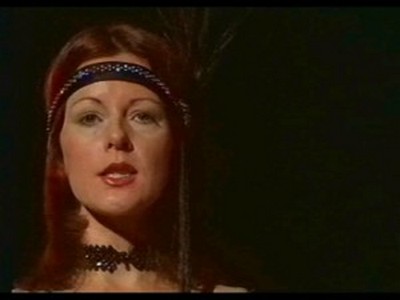
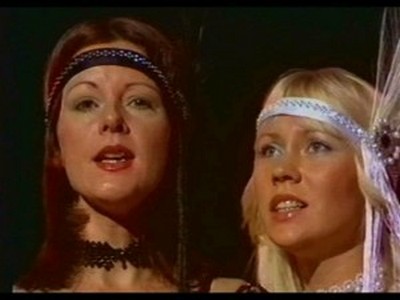
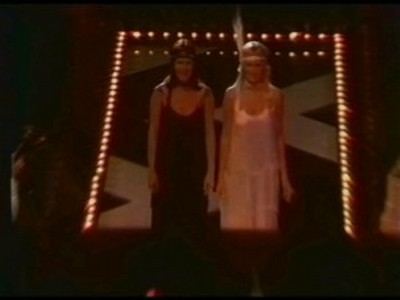
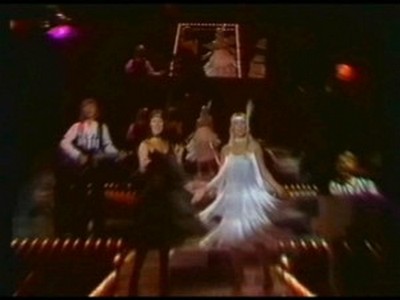
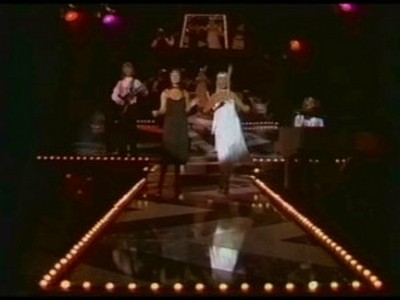

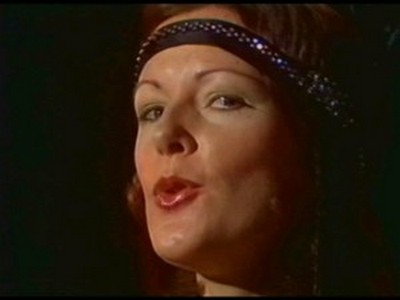
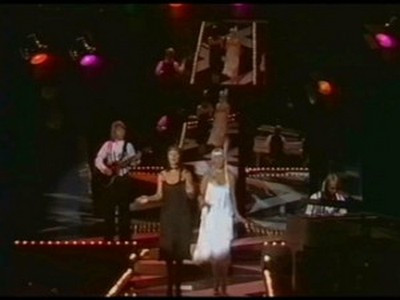
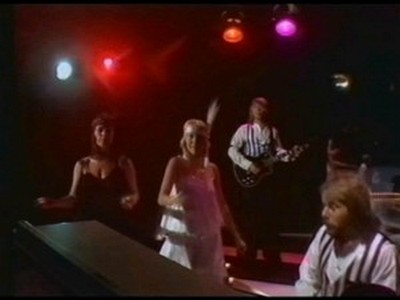
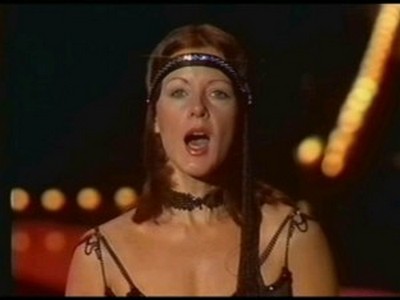
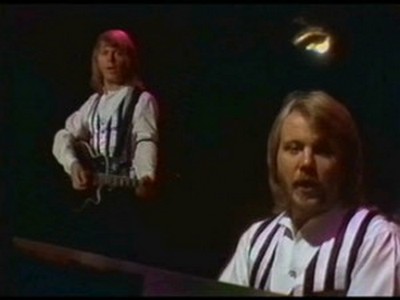
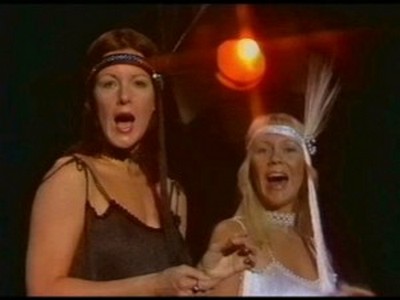
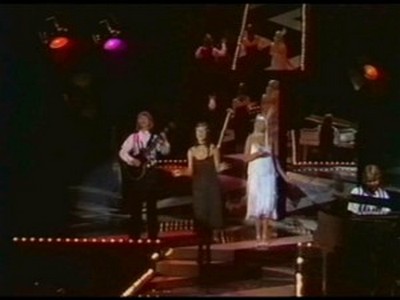
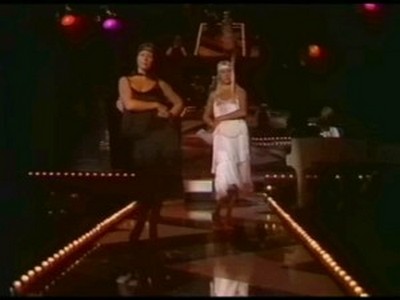
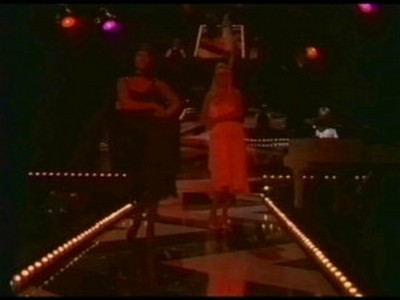
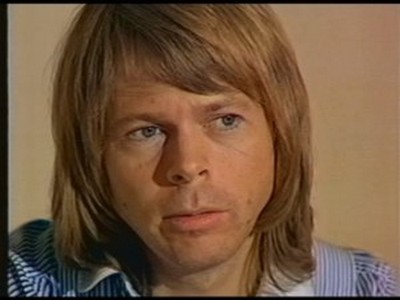
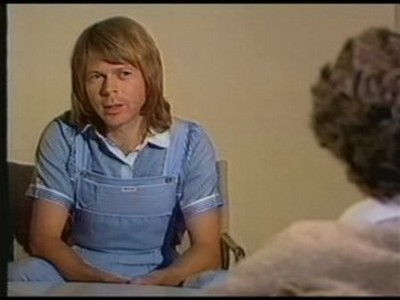
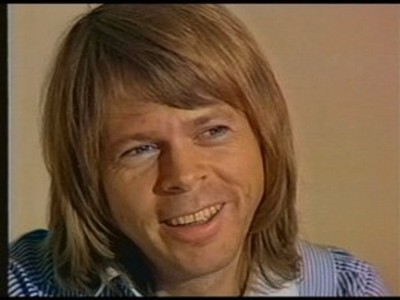
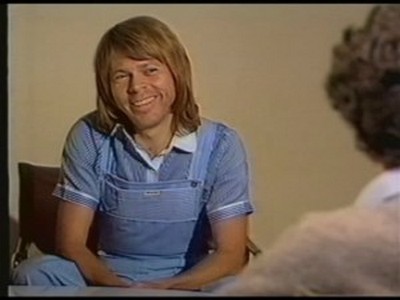
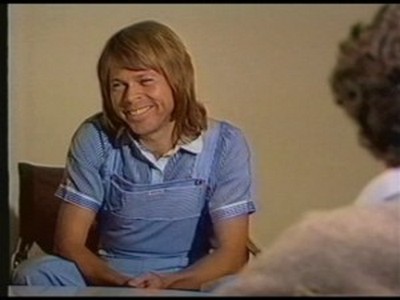
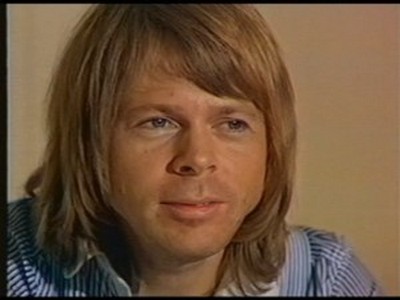
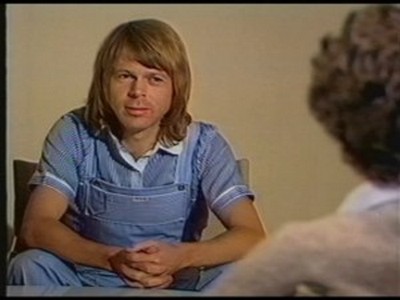
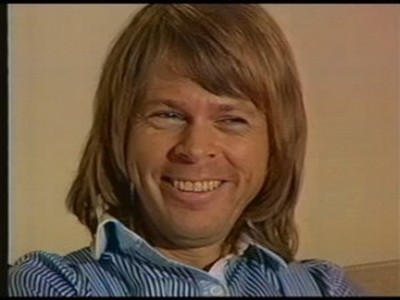
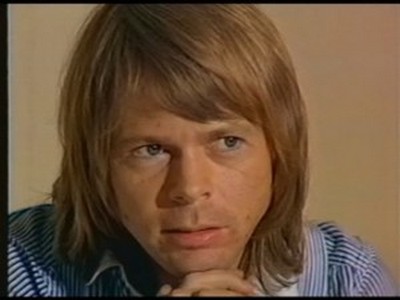
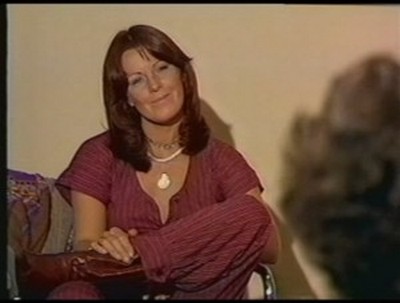
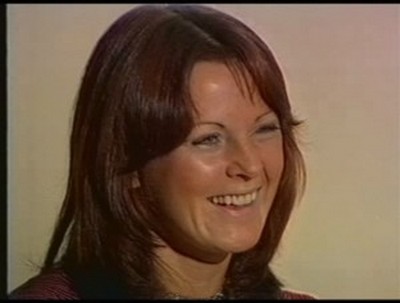
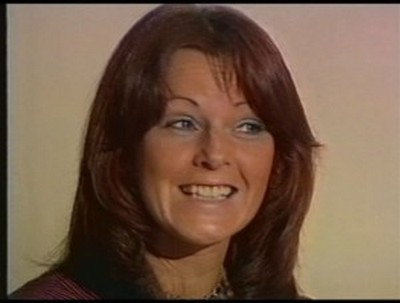
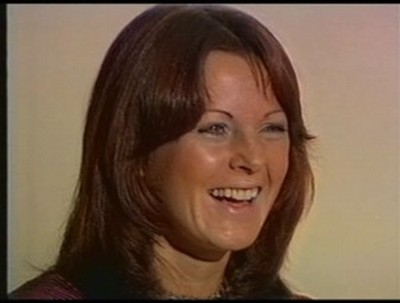
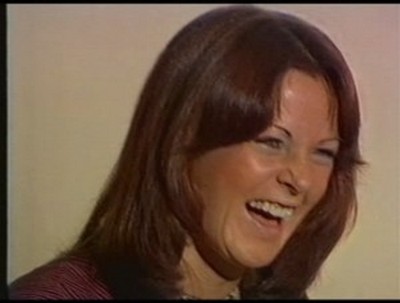
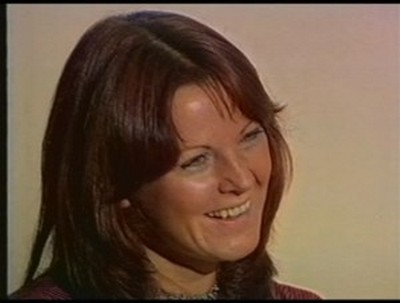
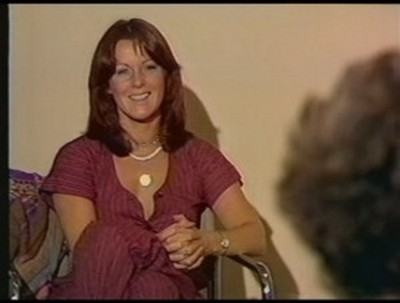
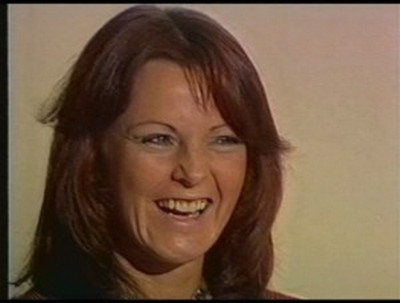
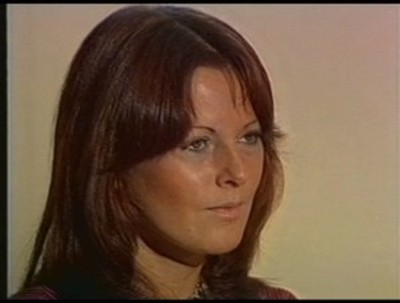
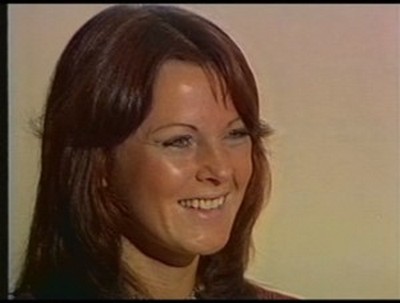
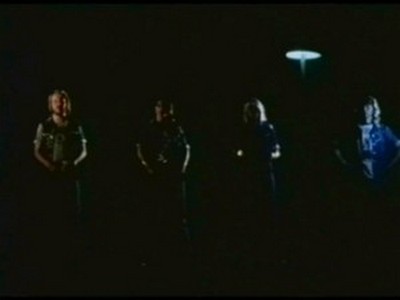
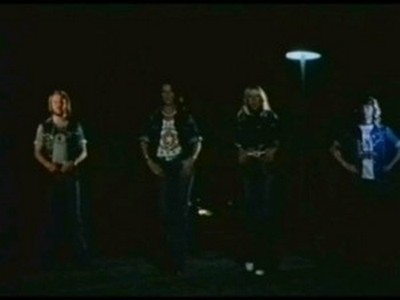
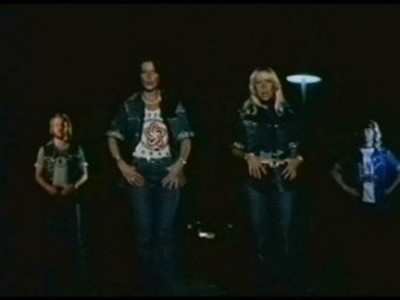
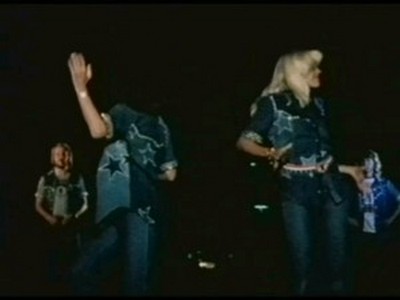
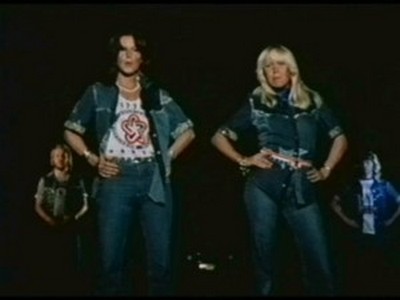
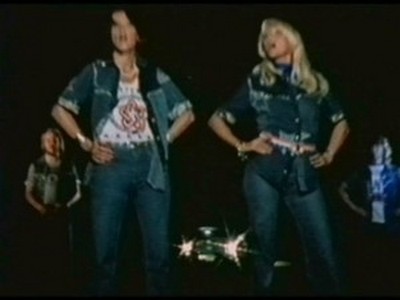
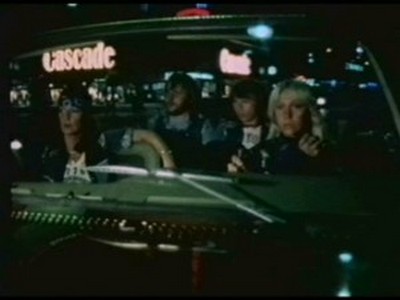
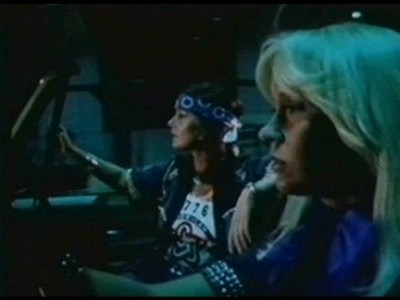
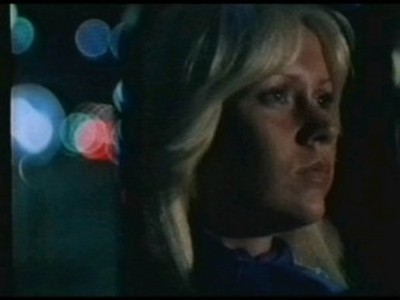
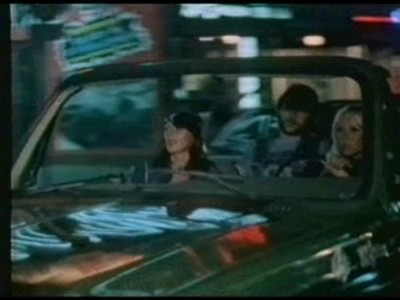
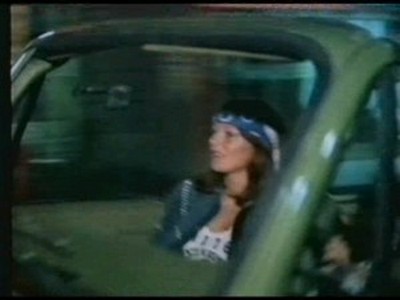
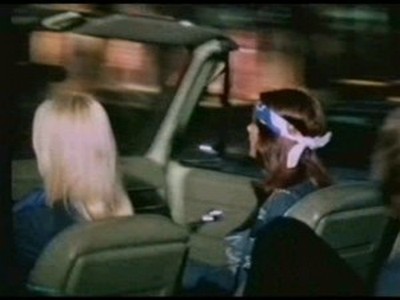
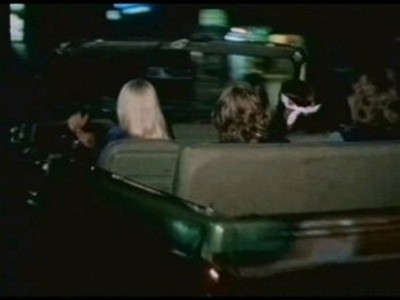
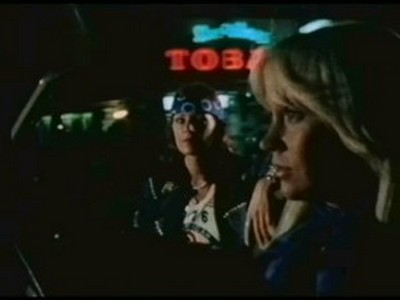
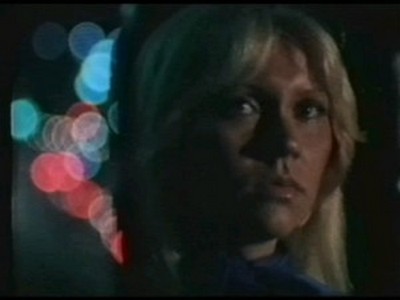
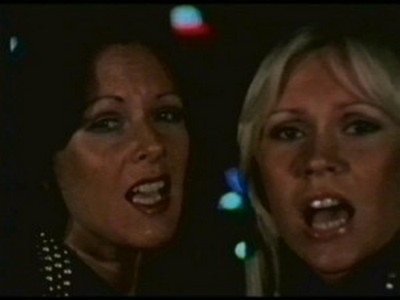
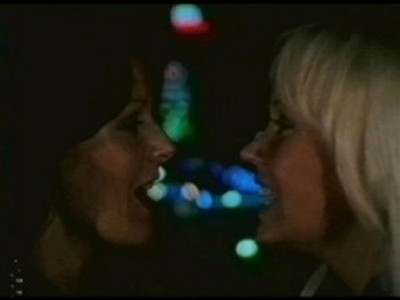
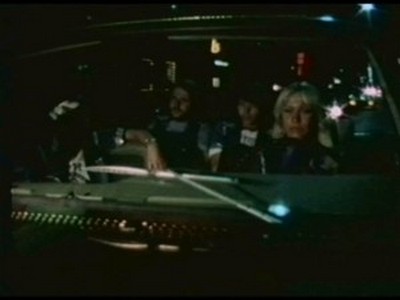
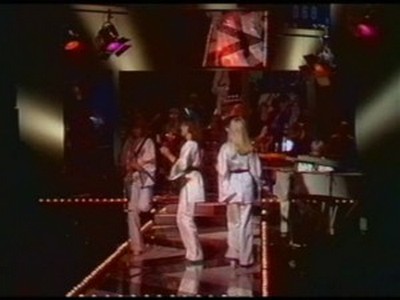
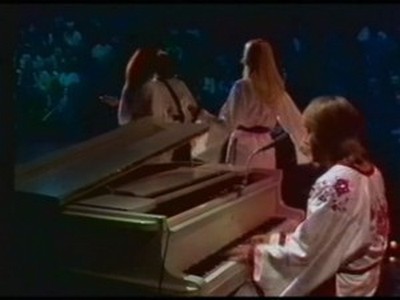
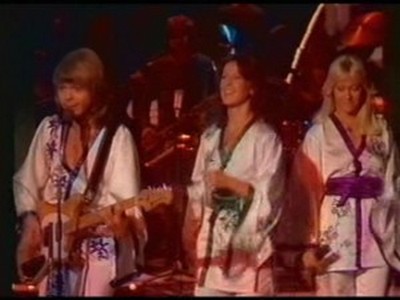
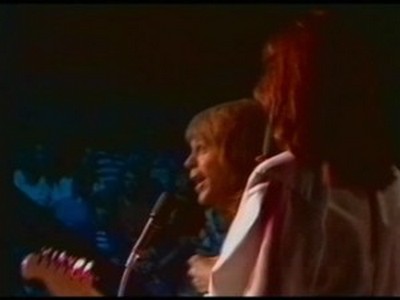
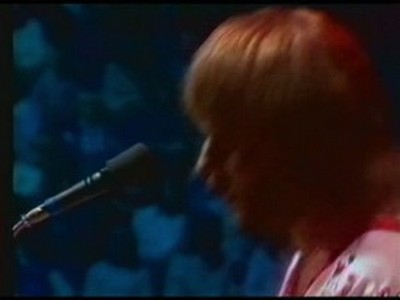
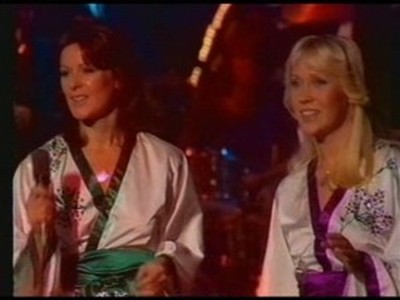
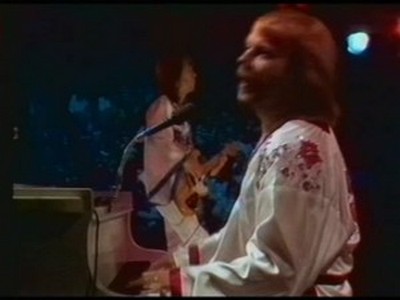
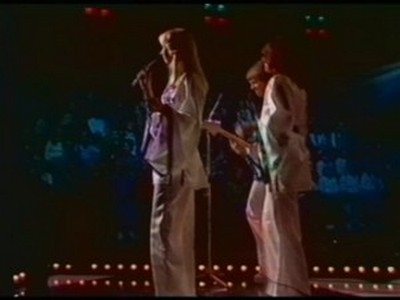
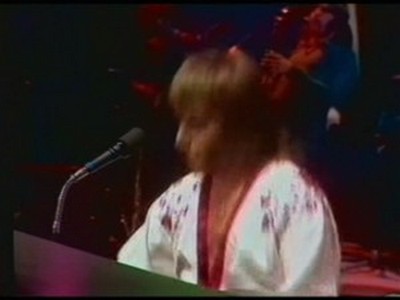

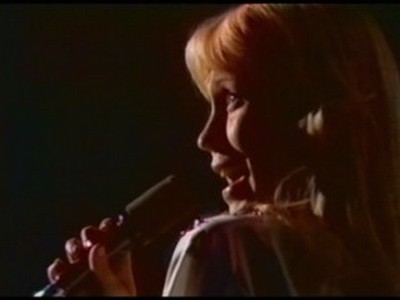
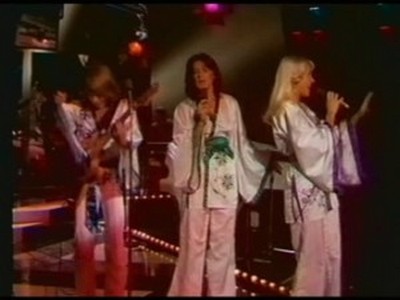
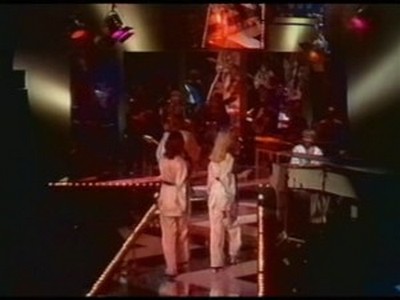
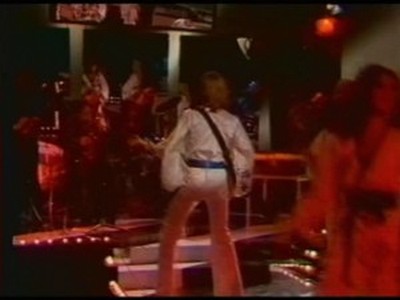
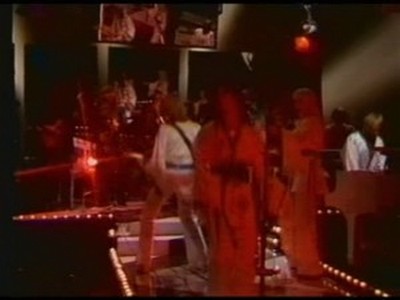
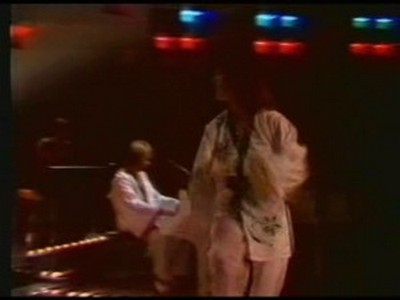
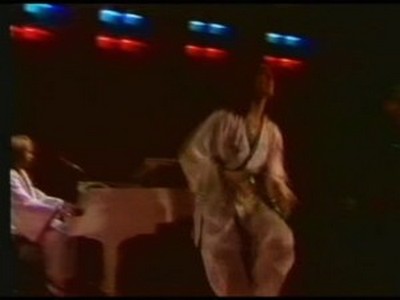
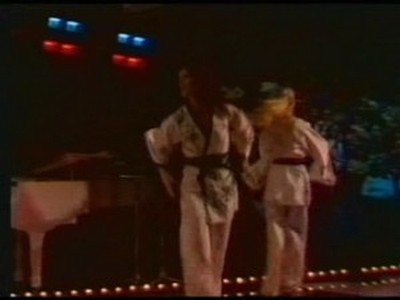
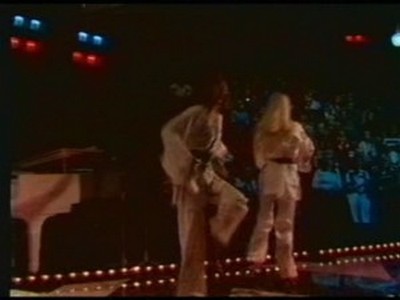
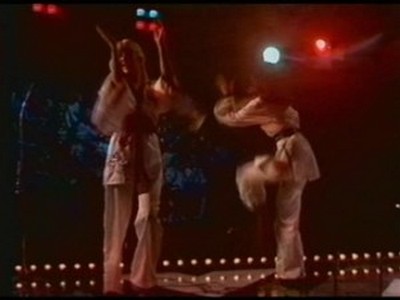
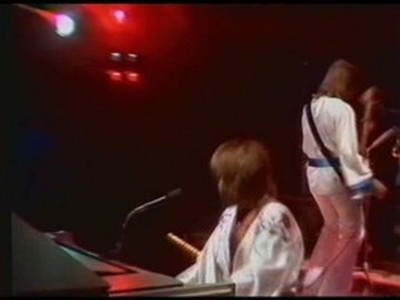
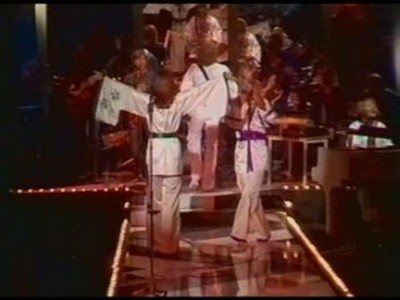
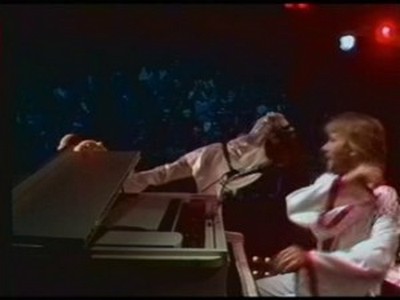
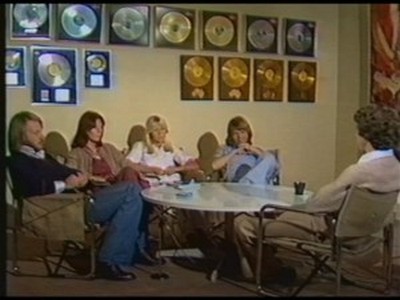
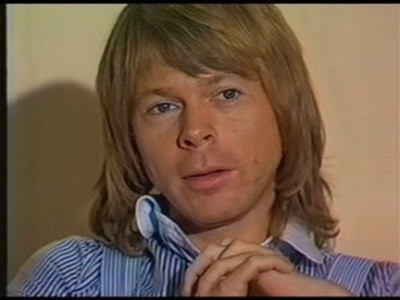
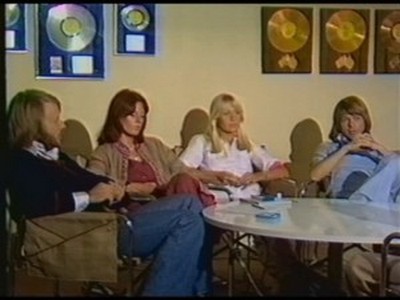
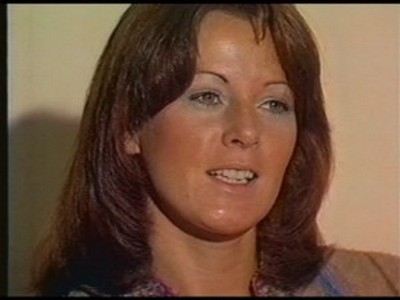
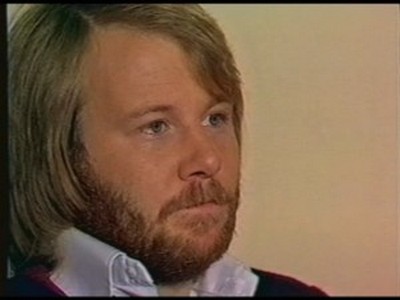
Filmed: Wednesday 29 September 1976 (Studio performances)
Location: Viggsö and Stockholm, Sweden
Release status: See below
Shown in: Sweden
This was the first real documentary about ABBA. It featured short interviews (in Swedish) with all four members together and individually (all looking fresh-faced, happy and fantastic) and film clips especially made for this programme as well as a mini-concert in front of an audience. Stig was also interviewed briefly and was shown playing and singing part of Tivedshambo on acoustic guitar.
The narrator and interviewer was Per Falkman.
One of my favourite bits is the few seconds at the beginning where you see them all laughing hysterically.
This would have been the first glimpse of the mysterious summer island of Viggsö and the song-writing cabin.
Songs featured:
- Knowing Me, Knowing You (Frida on the island of Viggsö and ABBA boating)
- When I Kissed The Teacher (PROMO clip especially for this programme).
- Dum Dum Diddle (LIVE studio performance)
- My Love My Life (PROMO clip especially for this programme - Agnetha only)
- Money, Money, Money (studio performance, but not sung live)
- Dancing Queen (PROMO)
- Tiger (PROMO clip especially for this programme )
- Why Did It Have To Be Me? (LIVE studio performance)
During the opening credits, there are also small snippets of Agnetha swirling around, Agnetha looking upwards and smiling (very briefly) and Frida winking which I'm not sure come from anywhere else, so must have been filmed as part of this programme.
The performance of Money, Money, Money was initially used in Australia as the PROMO until the proper Money, Money, Money PROMO became available.
This was the first performance of Knowing Me, Knowing You and the first appearance of the 1920s flapper dresses and white Arrival jumpsuits.
In Australia, it was during this programme (known as ABBA From the Beginning), that the five National commercials were first screened.
The programme was produced by Leonard Eek who had hosted Midsommardans från Solliden in 1971.
Click here for further information (Carl Magnus Palm's site)
This programme was included on the CD/DVD Arrival Deluxe Edition released in October 2006.
YouTube constantly blocks uploads of this programme due to copyright - sorry!
Broadcast information
Wednesday 27 October 1976 - Australia on Channel 9 19:30-20:30 (programme had been re-titled ABBA From the Beginning)
Friday 5 November 1976 in Sweden on Channel 2 at 20:00 and again on 14 July 1987 in Sweden as part of Det var då i TV2
21 December 1976, 16:00, AVRO, The Netherlands
28 December 1976, Norway
Summer 1977, Finland
1 May 2010 - YLE Teema, Finland from 21.00 - 21.56 as part of the channels Teemalauantai (Theme Saturday) series
19 March 2011 - YLE Teema, Finland from 21:00 - 21:57 as part of the channel's "ABBA Theme Saturday" a successful repeat from 2010
2 December 2012 - The Netherlands
The film clip of When I Kissed The Teacher was shown in the UK on Top of the Pops 2 - School Days programme on BBC2 from 22:45-23:45 on Saturday 25 September 2010.
3 January 2015, 22:00, Kultura TV channel, Russia
4 January 2015, 13:40, Culture channel, Russia.
The programme was broadcast in Australia at exactly the same time as Channel 7 aired ABBA in Sweden. The following day (ie. Thursday 28 October 1976 at 19:00-19:30), Channel 9 showed the Made in Sweden - For Export programme.
Click here for a TV listing from Victor Harbour Times - Wednesday 20 October 1976, p.16 which listed the following week's TV guide: ABBA from the Beginning broadcast on Wednesday, 27 October, 19:30-20:30 on Channel 9.
The teacher in When I Kissed The Teacher was famous Swedish comedy actor Magnus Härenstam who went on to play Frida's lover in Jokerfejs in 1983.
ABBA-dabba-dooo!! translation
(Taken from Intermezzo Magazine No.23)
anslated from Swedish on video by Ulla Sahlberg, Finland
Narrator: That Swedish supergroup ABBA, do they actually exist? You may wonder about that if you live in Australia. Down there some believe that those who play ABBA's music are too ugly to be shown and that they have arranged for beautiful young Swedish people to play ABBA. In Germany, there's a rumour every now and then that ABBA are dead (a newspaper article is shown). And in Sweden, people don't like to admit that they actually do exist which only proves that it is difficult to be popular in one's home country.
(Waterloo)
Narrator: We were all little - Lassie, Tito, Beatles, Pippi Longstocking, Lennart Hyland, Ricki Borsch, Björn Borg and Birgit Nilsson. Some, Napoleon for instance, was small even when he was big. Others, Shirley Temple for example, was biggest when she was small. But how small were ABBA?
Björn: First of all, welcome (laughter and giggling in the background). I was about 50cm!
Narrator: We can now confirm that size doesn't matter!
(Knowing Me, Knowing You)
Narrator: From Brighton in the south of England in 74 to Norway at the end of the war 45, it's a long and quite a troublesome way. Frida, or Anni-Frid as you call her in Norwegian was born here. The first big A of ABBA. Generally, people in Sweden say that Norway never really contributed to anything else to help Sweden. What's wrong with fish liver and cranes you hear Norway reply to that, and don't forget the author Fleksnes? That's about it, says Sweden. OIl and the artist Grynet Molvig. Only the best is enough, cries Mother Sweden and brings one year-old Frida into her arms in a part called Torshälla. Here she has a place to grow.
Over to Gothenburg now, the city in between dock yards. In 45, fish boats come to town with the silver of the sea - the herring. Factories are in full work and money pours in. A booming economic life witnesses the birth of Björn Ulvaeus. Without any thoughts of localisation, the Secretary of Finance allows the Ulvaeus family move to Västervik, or West Bay as the forthcoming English translation would later sound when Björn becomes big, or close to being big.
The year is still 1945. We take a look towards Jönkoping, the Jerusalem of Småland. Nothing happens there - not yet. OK, we wait for a while and then crawl towards Stockholm. It seems like something was going on here. Since the way, the number of children has increased. One example of the growth was, for instance, the son of Laila and Gösta Andersson, christened forseeingly to Benny. That saves the name of the supergroup ABBA. Just think if Mr Andersson had given his son the name "Stig". What consequences would there have been - can you think of a supergroup by the of "ABSA" or "ASBA".
The rest of the 40s went by without any initials being born. But in 1950 it's time. Birgit, the wife of the Jönköping cabaret king Ingvar Fältskog, gives birth to a little girl. When she slapped on the bottom after the birth, she cried a three time F-note and it was decided immediately that she would become a singer with the name Agnetha.
(When I Kissed The Teacher)
Narrator: There are 25,000 islands in Stockholm archipelago. The archipelago is a scarcely inhabited area with people moving away But now there is a new generation on its way to inhabit the archipelago. People want to move away from the poisonous, aggressive and stressful city life. Different industries, craft firms, services are being established, now also music production. That kind of music that has so far sold 20 million records is being composed here. This little cottage is the heart of the record emporium.
(Interviewer meets Benny and Björn)
Interviewer: So this is where it's at?! This is ABBA's music factory. Here is where you sit and compose. And no paper, no pen, no cassette player. Don't you even have to have some paper and a pen in order to write music?
Benny: No, it's not necessary - not in our case anyway.
Interviewer: How do you do it then?
Björn: Well it's a question of having a melody ... what we do here - it is almost like writing melodies which you can then keep in your head. You see, if you can't keep it in your head, you know the melody is obviously not very good.
Interviewer: You come here with empty heads and sit down with the instruments and start playing and then there's a melody - is it like that?
Björn: Yes, exactly.
Interviewer: Describe it, show me how ...
(Benny and Björn start playing something)
Benny: Well, it is a bit difficult, you see, but .... (Björn is mumbling something). You sit and play as long as ... maybe only ... you take the right tempo ... so that you don't know ... you just (he's playing). It can be whatever, and then you sit and hum and sing some silly kind of English that is a convenient language to sing.
Interviewer: And then you both suddenly feel that there's a melody that is good.
Björn: Yes, when there is something that is "catchy", we both feel that 'this is something' .. if you want to come up with a more complicated melody it can take a longer time before you ...
Benny: It is often so that some things are - are and remain good when you have them a few times.
Interviewer: OK, it's the music that just appears from somewhere. Where do the words come from?
Björn: Well they ... it is often Stikkan who writes the lyrics and thinks about them - and then we actually record it if we both feel the lyrics fit perfectly. Then you just might have to think about a story around one good line. The music is still the most important thing and the lyrics are somehow an instrument among others.
Interviewer: But the lyrics don't have a role of their own then?
Benny: Well actually maybe they do. Because they are surely more important than you think when you mostly work with the music. However, I know that Stikkan works a lot on just coming up with an idea, a catchy melody, for instance. That takes time I think to come up with a phrase or ...
Interviewer: Yes, but the way you work with voices on your records .... when one listens to them and compares your work with a singer and an orchestra, the singer is a separate part and the orchestra another part, but on ABBA's records, I think, it's all together as one musical ..
Benny: ... (interrupting) mess! (laughing)
Interviewer: ... mix, yes, mess! (laughing)
Björn: Yes
Interviewer: the voices do not quarrel with ...
Björn: Yes, that's what we're aiming for. Once at the very beginning when we had only just started as ABBA, we thought about it. I think we had remixed "Ring Ring" that is, balanced the song and all the instruments with each
other. When the single was finished, we sent it to Radio Sweden and they phoned us and said, "What is this? There has to be something wrong with it - it can't possibly sound like this."
Benny: There was a great number of people, not only from Radio Sweden, who asked, "What is this? Should it really sound the way it does?"
Björn: And it was because of that that the song was relatively vague in relation to what records are usually like.
Interviewer: It means therefore that you actually do not spend that much time on the lyrics, the sound of the voices is obviously more important.
Björn: Yes, but the sound of the lyrics is also important, not only the meaning, that is what we're trying to say, without a certain sound of the lyrics.
Benny: The text has to "flow" if the melody "flows" too. That is important.
(Dum Dum Diddle)
Narrator: The Jönkoping cabaret king had a musically talented child. As early as 1950 when she was only five years old, Agnetha wrote her first song. It was called "Three Small Trolls" and it was very popular - at home. Later, in 1957 when she was seven, the family decided to invest money in a piano for their daughter. It was a wise investment. Already as a musical wonder child in Jönkoping, she decided to become a singer. Connie Francis was her big favourite. She sang together with Bernt Enghart's orchestra - they were based in Småland - and if she wasn't singing, she was sitting on the switchboard at a car firm. All the time she dreamed of a nationwide career and she therefore sent tapes of her singing to record producer Little Gerhard. Little Agnetha was brought to Stockholm to record a single.
(Jag var så kär in the background)
Interviewer: What do you think when you hear this?
Agnetha: I remember that it was the first single I did and hw terribly nervous I was to record it because I was only 17 and had never been to Stockholm. I took my father with me to hold my hand. And there we were, at the Philips Studios and sound engineer Sven-Olof Walldorf had mixed these songs so when w arrived I remember I heard them adding strings to my song. Dear God, my song! i couldn't believe it was true. It is almost the most fantastic thing I've been involved with. I think. that feeling of witnessing something that I've created was being played by a big group of people - it was great.
(My Love My Life)
Interviewer: Music and oxygen meant just about the same for Benny when he was little. Both were so obvious that you didn't need to think about them. Benny didn't think of becoming a musician. Actually he didn't think of becoming anything at all. his parents wanted him to become a construction manager. Both his father and grandfather were in the business. But father and grandfather were both also musicians. There was bound to be a conflict between the pressure to get a profession and the urge to play.
Benny: I'm not a fatalist really, but it all comes from them, I think. Grandfather was a musician in his leisure time. He was a carpenter but in his free time he was a musician. He enjoyed that the most.
Interviewer: Did you like your grandfather's music?
Benny: Oh yes, very much so - the accordion. Father also played the accordion. So it was obvious they'd give me a drum set!
Interviewer: And eventually an accordion?
Benny: No, I got an accordion later when I turned six. Then we played together.
Interviewer: Was it natural to play with your father and grandfather?
Benny: Yes it was. I believe that was the most enjoyable thing for me all through summer holidays. And I think a lot of it is still inside me, all the roots. I think I'm most happy when I play Swedish folk music, violins, a group of folk musicians - that is what feels the best.
Interviewer: But you like ABBA's music?
Benny: Oh yes, we have tremendous fun when we work together and I couldn't think of anything else to do.
(Isn't It Easy To Say in the background)
Interviewer: "Isn't It Easy To Say" That was your first job together.
Benny: That happened at a paper factory in Västervik - wonderful. Björn's father ... I came home in the middle o the night. Björn did too. We started to drag in amplifiers and things. "No, you can't stay in the basement here because you'll wake up the house." he took us to the paper factory in Västervik where he worked. We could sit in his office up on the third floor. we dragged in amplifiers and guitars and everything. It was so sweet of him to let us do that really.
Interviewer: Yes it was .. and you should be grateful for ...
Narrator: Booze, sex, drugs, fights and broken damaged hotel rooms is what it said about super groups across the world if you believe what you see in the papers. But not even the meanest of people have succeeded in finding ABBA in a juicy scandal. Those tight silk trousers, silver boots and that other glitter should maybe a sign of a certain kind of life - but that isn't the case. The glitter is what ABBA wears to work. Behind the scenes are four normal young Swedish people with normal Swedish relations. Two of them are married to each other and two of them are married "the Stockholm way" that is, they live together. Nothing exciting that is.
(ABBA and the Interviewer all together)
Björn: It is so easy to say that we are really ordinary people.
Frida: You are not supposed to say that any more. I've read in an article people are unique, there are no ordinary people and you hsouldn't be afraid to say that you are unique - I am unique!
Benny: That's what you think!
Agnetha: But it is very difficult to talk about yourself ...
Frida: ABBA - they?
Interviewer: There are .. of all public personalities there are made up pictures in press and TV - that is Benny, that is Frida, that is Agnetha and that is Björn. But as far as I know you don't quite agree with those descriptions?
Benny: The most difficult part - not the people, not the public, but the interviewers, journalists, they have difficulties in understanding that we do something that we love ourselves, we talked about it earlier. We have been fortunate to be able to do what we love the best. We think the music is good. We can't do better than this at the moment.
Interviewer: You don't make a product just to sell it?
Benny: No
Agnetha: No, that word always comes up somehow
Björn: It is important. What we always always experience is the doubt of, "ha ha! to make a song is so easy and you just aget all the money."
("Money Money Money")
Narrator: Björn Ulvaeus' sway to success is as straight as a German motorway. It all starts at home in Västervik. His musical upbringing was given to him by his father who played the mandolin.
Björn: And what you heard on the radio of course "Vildanden" (???) for instances, oh, that was fantastic.
Interviewer: That captured you?
Björn: Yes, the tragic - I don't even think I understood the lyrics correctly - but the lyrics were deeply tragic and they captured me anyway. I had a cousin who was one year older than me and who was really musically talented and who played the trumpet, guitar, banjo and piano. We would always have fun when he played for us at Christmas for example you see and that made a great impression on me.
Interviewer: To play or fascinate the public?
Björn: Yes both I think
Narrator: 1962. Björn is 17 years old now. Bjorn and some of his friends went from house to house and played as The West Bay singers. Vastervikssangaran. When they realised that not only themselves but others too like the music they played, they continued playing together. They got on swell that they even were presented in a magazine and next year they won radio talent contest, On Stage ("Plats på scen"), with the name The Hootenanny Singers.
Björn: It was the beginning of a spin on a carousel because there hadn't been anyone of that sort and there was a need of such at many amusement parks. We began to travel around with an old bass on the roof of an old car.
Interviewer: And you thought it was fun?
Björn: It was fantastic! It was huge you see! Really great!
Interviewer: Your parents, your sister, your wife and your friends - how would they describe you? What have they told you about yourself? how do they characterise you? Do you understand what I mean?
Björn: What the hell have they said?! Not stubborn, not mean, not sweet, hah!
Interviewer: Are you an optimist?
Björn: Um, not exactly an optimist, not pessimistic either. A bit selfish maybe.
Interviewer: A straight-forward person
Björn: Yes, that's probable.
(Dancing Queen)
Narrator: Do you remember that we have talked about Torshälla in this programme? Yes, it was there where the little Norwegian child would have room to grow up. It didn't take long for her to grow: at only ten years old she was crowned the Childrens Day (Barnens Dag) Princess. She imitated her big idol Ingeborg Nyberg at charity events, and at 13, she got a job as a vocalist of a real dance orchestra. She won all the talent contests in the whole of Södermanland (province) and moved from the idyllic little Torshälla to the town of Eskilstuna with an entertainment programme, worked devotedly as a singer and in 1967 something happened. She won the final of Barnens Dag
nationwide talent contest and was immediately taken from Skansen (amusement park) where the final was held to Hylands Hörna (a popular TV programme) where she had her breakthrough.
(En ledig dag - Frida laughs)
Interviewer: Is this fun?
Frida: Yes, it's fun and I am glad to know that I have improved at least a little bit over the years!
Interviewer: This song you sang at Skansen in the final - was it fun to be discovered? The march to the top?
Frida: The march towards the top has always been tough but of course it was fun because I had already worked in a number of dance orchestras since I was 13 - over a period of 10 years. Working in a dance orchestra for such a long time is not quite fun.
Interviewer: It seems like you lived two lives - when I watch you on stage and now when we sit and talk ...
Frida: It is different to stand on a stage doing what I know I can do which is how I feel today. And besides I think it is tremendous fun. There is nothing more fun than this. You can be free and be what you really want to be. "I am here now, you be you'll see something!" (laughs) Do you understand? you put your hole soul into it. It is so much fun to give everything then, and only because you like it so much.
Interviewer: It is 100% then?
Frida: It is 100%, there is no way back.
Interviewer: And you think it's wonderful to give 100%?
Frida: Yes, absolutely.
Interviewer: How do you feel now when you sit here and talk? How are you?
Frida: Well, it would be better if the TV cameras weren't on. When you talk about yourself as a private person it's difficult because you don't want to reveal yourself totally, you want to keep something back for the closest people to you, something that really isn't anyone else's business. And the most difficult part of being a public figure is maybe to know where to draw the line.
(Tiger)
* * * *
(Street poll)
Interviewer: Do you like ABBA?
Elderly man: ABBA? Yes, that's anchovies - right?!
Elderly woman: Yes, ABBA are alright.
Young man: Not really.
Australian: So far I like the sounds they make!
Woman: They are really popular in South Africa where I come from
Young man: No way!
Woman: I don't know anything about it
Elderly woman: ABBA - yes, they're good.
Young girl singing: "Ring Ring, bara du slog en signal"
Young man: They are too commercial
Young woman: Crap
Interviewer: Not your type of music?
Same young woman: No, totally crap!
Australian girl: They are get-up-and-dance songs
Russian man: No, we have not yet seen this group.
Young man singing: "Mamma Mia, here I go again"
Immigrant: They are good, there's much really anything else in Sweden.
Woman: Yes, very good.
Elderly woman: No
Older man: ABBA? No, I don't know ... a cleaning firm, what do I know
* * * *
(ABBA sitting at a table at Polar Music)
Interviewer: When I go out and talk about ABBA with people, a word that often comes up is "they are so professional, they are commercial, they are well promoted". This seems to be a popular opinion about you in Sweden.
Björn: Yes, but why should we do a worse job than we have to? I mean, why shouldn't we do it as well as we possibly can at every level. And that includes promotion, it concerns everyone. If you think you have done a good
job recording the music, why should you do a worse job when you promote it?
Benny: From the beginning, you want people to know about the things you've done. Bjorn and I had been writing songs for many years before anything happened abroad, aiming at going abroad you see ...
Interviewer: But without Stikan it wouldn't have happened so quickly to be known abroad?
Agnetha: No, he has done the ground work you could say
Björn: The thing was that we were fortunate not to win the year before with "Ring Ring". we learned a lot about what to do when we won the following year.
Benny: You see Stikkan had ... before "Waterloo", before Brighton ... he had plans. Whatever happened, that if we won it would have to be like this and this and this. It was all done. There was nobody who had to phone and ask "who are they? is the record available?" It was all planned beforehand.
Björn: When we won, it was like you had to push a button and everything worked all over Europe!
Narrator: Stikkan Anderson, the man with a special musical touch has a well developed sense of business. A musical gangster who rules his musical emporium towards new millions his critics say. There are quite a lot of those today. Supporters? Yes, he has placed Sweden on the world map of popular musical. He is straightforward, fast and honest in business. He has a sense of anything that is good.
(Stikkan singing a verse of Tivedshambo)
(Interviewer at the Opera in Stocholm)
Interviewer: Chief of the Opera, Bertil Bokstedt, what do you think of ABBA?
Bertil Bokstedt: I think they are wonderful. When I saw them at the wedding gala on 18th July I thought that is was wonderful and I want to see them at the opera again.
Interviewer: Are you beginning to see ABBA as a competitorr?!
Bertil Bokstedt: Yes, maybe because when you look around an notice those wide smiles of fascination which will the Kings's Court Men gave them and the wonderful atmosphere when Benny took his seat at the piano - it was wonderful.
(Why Did It Have to be Me)
The denim shirt worn by Benny in the Tiger video was sold at Auction in 2020 and apparently donated to ABBA - The Museum.
For When I Kissed The Teacher, they all wore American Football team shirts: Benny wore Miami Dolphins, Björn wore Hawks and Frida wore Bears. Agnetha's did not have a team name on it.
Archive data from Swedish Media Database:
1976-11-05
Namn
Grupp/institution ABBA (medverkande)
Utgivning
År/datum 1976-11-05
Anmärkningar
Anmärkning Programmet ingår även i DVD:n Arrival med accessionsnummer VR06-4482.
Exemplar
VCR T85-0020
Antal enheter 1
Färg Färg
Leverantör HKF 1985
Arkivnummer T85-0020
Thanks to Jan Bach, Ian Cole, Carl Magnus Palm, Philip Muytjens, Anthony Harrison, Dmitry Shipov, Petri Kaasalainen, Harold Hanlon, Danny Guyon, ABBA Annual, Robin Andersson, Steve Layton, Philippe Dupont, Jozsef, Rod Kirkman, Richard Knight, Lynette Rawes, Vladimir Malafeev and Alex Jones.